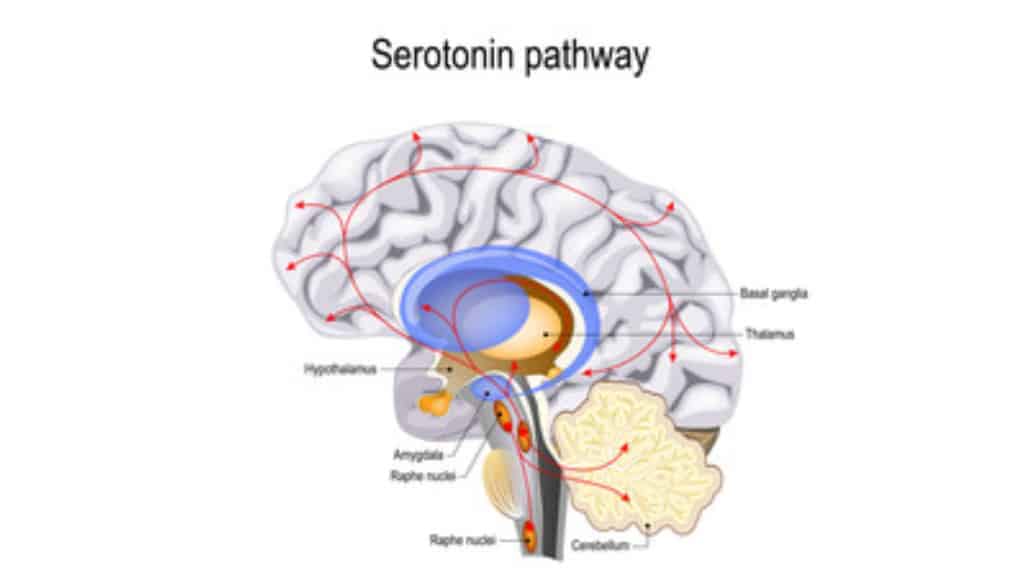Serotonin is one of eight chemicals that enable neurotransmission or communication between nerve cells. As such, science refers to this chemical as a neurotransmitter. As we will soon see, your serotonin levels drive several critical functions within the brain and body.
The purpose of this article is three-fold – namely, to explain: (1) serotonin and what it does, (2) the role of serotonin in your daily life, and (3) natural ways of boosting your serotonin levels (with no prescription meds!)
So let’s get things rolling by first talking about what serotonin is and what it does!
What is Serotonin?
Scientists refer to serotonin as the “mood chemical” because of its effect on our mental wellbeing. Per WebMD, serotonin also “acts on” the non-mood-related parts of the brain, including the blood vessels and pain control pathways.
Our nerve cells synthesize serotonin, which, in turn, uses the chemical to send signals between nerves from across the entire body. Despite associating primarily with its actions within the brain, the gut actually produces and holds most of your serotonin–about 80 percent!
Our blood platelets also house much smaller amounts of the chemical.
Serotonin production involves the integrated chemical reaction of two types of the amino acid tryptophan. Research demonstrates that low tryptophan levels directly link to a deficiency of serotonin. Speaking of which, let’s discuss serotonin deficiency.

Serotonin Deficiency
“When serotonin levels are lower than normal, this is…“serotonin deficiency,” and can result in a variety of symptoms including impaired body functions and…psychological disorders.” ~ Puya Yazdi, M.D. (Source)
Serotonin deficiency might even be a leading contributor to mood disorders. Current neuropsychiatric theories of depression and similar disorders focus on an imbalance of serotonin along with norepinephrine and, to a lesser extent, acetylcholine, dopamine, and epinephrine.
Common symptoms of serotonin deficiency may include:
- anxiety (including panic disorder and obsessive-compulsive disorder, OCD)
- behavior problems
- carbohydrate cravings
- gastrointestinal problems
- general pain
- PMS complications
- sleep-cycle disturbances
What Does Serotonin Do?
“The leaves and my serotonin levels are falling.”
~ People who love the fall and despise winter (Hallelujah!)
The primary role of serotonin is to transmit messages between nerve cells throughout the body. Scientists believe that the chemical also contributes to smooth muscle contraction.
Concerning mood, research shows that normal serotonin levels promote calm, concentration, emotional stability, and happiness. Dysfunction of the brain serotonin system is also might trigger “exaggerated fear responses” stemming from anxiety-, trauma- and stress-related disorders.
Proper serotonin levels also help to reduce feelings of anxiety and depression, heal wounds, regulate bowel movements, stimulate nausea (which is actually a good thing, as this helps us to eliminate bad food), increase sex drive, and strengthen bones. It also helps to normalize the circadian rhythm (“sleep/wake cycle” or “internal clock.”)
Research also suggests that serotonin may be involved in processes such as breast milk production, cell division (mitosis), bone metabolism, and liver regeneration.
Serotonin is thought to influence the vast majority of brain cells.
Serotonin and Depression
“People who are clinically depressed often have very low levels of serotonin.” ~ Dr. Daniel Amen, M.D.
Serotonin deficiency may contribute to the onset of depression and anxiety disorders. It’s worth mentioning that recent research questions the “serotonin hypothesis” of depression, arguing that “Simple biochemical theories that link low levels of serotonin with depressed mood are no longer tenable.”
Scientists state that a balance of four neurotransmitters – serotonin, along with dopamine, endorphins, and oxytocin – is crucial to feeling happy. In this biochemical balancing act, serotonin is involved in not only perking us up, but supporting feelings of self-confidence, facilitating deep and sustained sleep, and even promoting a healthy appetite and social life.
Regardless, the Food and Drug Administration (FDA) has approved multiple classes of prescription drugs purported to reduce depression and anxiety symptoms. The most popular class being ‘SSRIs’ – selective serotonin reuptake inhibitors – which increase serotonin levels in the brain. Most available prescription drugs that are designed to relieve depression target the serotonin system. These include:
– SNRIs (serotonin-norepinephrine reuptake inhibitors),
– Selective serotonin noradrenaline reuptake inhibitors (SSNRIs)
– Tricyclic antidepressants
– Monoamine oxidase inhibitors (MAOIs)
The issue with prescription drugs
The problems of antidepressants are well documented. First, there’s the issue of effectiveness. Compared to a placebo (“sugar pill”), antidepressants are as little as 20 percent more effective. However, antidepressants do appear to be potentially better received among those with chronic moderate and severe depression rather than ‘mild depression.’
Second, there’s the issue of cost. In the United States, which lacks a national health coverage plan, brand-name prescription drugs can cost upwards of a couple to a few hundred dollars monthly. Fortunately, most antidepressants offer generic alternatives, which are far less expensive. Still, advancements in depression research and treatment will likely entail high drug prices in the future.
Lastly, there’s the issue of side effects. WebMD cites “a wide range of [common] side effects,” including agitation, anxiety, blurred vision, constipation, dizziness, drowsiness and fatigue, dry mouth, erectile dysfunction insomnia, increased appetite and weight gain, irritability, loss of sexual desire, and nausea. (That’s all?)
How to Naturally Boost Serotonin
1 – Diet
It’s possible to increase serotonin levels through the foods you eat. Just make sure that your shipping list is full of foods that are high in l-tryptophan. Examples: bananas, beans, beef, cheese, chia seeds, chicken, dark green leafy vegetables, eggs, lentils, nuts and seeds, oats, peanuts, pumpkin, salmon, tempeh, tofu, tuna, and turkey. Milk is also a good source of the amino acid.
It must be mentioned that a balanced diet, complete with the essentials such as protein (especially protein, as it’s high in tryptophan), whole carbohydrates (e.g., legumes, potatoes, veggies, whole fruit, and whole grains), natural sugars (such as those found in fruit), and plenty of water will most certainly lead to a better mood and, perhaps, more balanced neurotransmitter levels in the brain.
2 – Exercise
Per an article published in the Journal of Psychiatry and Neuroscience, exercise increases serotonin function in the brain.
The researchers cite studies that measured metabolites (substances produced by metabolic activity) that serve as markers for serotonin levels. In one case, researchers found that exercise increased two precursors of serotonin – tryptophan and ‘5-HIAA.’ In another, scientists found that physical exertion directly correlates with “increases [in] the firing rates of serotonin neurons,” which “increased the release and synthesis of serotonin.”
3 – Keep Your Gut Healthy
Around 80 percent of our body’s serotonin is in the gastrointestinal (GI) tract. Moreover, recent scientific research has discovered a complex communication network within the gut, extending to the brain. Scientists posit that one job of this network is to relay pertinent information between the brain and gut.
Per an article titled “The gut-brain connection” by Harvard Medical School, “A troubled intestine can send signals to the brain…[and] [the] brain can send signals to the gut…a person’s stomach or intestinal distress can be the cause or the product of anxiety, stress, or depression.”
In other words, Harvard is saying that your gut health definitely impacts your mental health – and vice-versa. As such, consider taking a quality probiotic, drinking plenty of water, and eating a brain-healthy diet.
4 – Supplement
Nutrients such as Vitamins B6, B12, C, and D3, fish oils, folic acid (folate), magnesium, and zinc, all help to metabolize and utilize serotonin stores more efficiently. While not connected with an increase in serotonin levels, supplementing with magnesium (especially a highly bioavailable form like magnesium gluconate or aspartate, may help to stabilize the mood.)
Other supplements that may aid mood function to a greater or lesser degree include 5-HTP and DHA (docosahexaenoic acid) – a common fish oil component.
5 – Meditation
According to an important study published in the Journal of Psychopharmacology, meditation practice raises two serotonin brain receptors called ‘5-HT1A’ and ‘5-HT2A’. The former is involved in the passive coping (“tolerating”) stress, while the latter is part of the active coping (“addressing the source of stress) mechanism.
Besides possibly directly raising serotonin levels, meditation also aids production indirectly through the reduction of stress hormones.
Here are some other research-based ways to elevate those serotonin levels:
– Getting a massage: Massage therapy increases serotonin by 28 percent. Those who embrace the practice also have 31 percent less cortisol (the primary stress hormone) on average.
– Get out in the sun: We mentioned vitamin D, so now let’s talk about its key source: the sun! Yes, there is a clear correlation between exposure to sunlight and serotonin levels!
-Laugh and be positive: Isn’t it funny how laughter seemingly cures everything? That’s because it makes us feel so darned positive and happy. Speaking of happy, a good tip for stimulating serotonin production in the brain: remember a happy time in your life!
– Ask your doctor to check your hormonal levels. Certain hormonal imbalances and sudden changes can lead to a rapid serotonin drop. One example of this is in early menopause, where women (whose body holds about fifty percent less serotonin than men) are particularly at risk of depression.

Final Thought: If it’s depression, don’t go it alone
Depression is a hard, hard disease to deal with. While some people rail against antidepressants and other therapies, they can be lifechanging in some instances.
So here is the bottom line: if you are struggling with your state of mind, seek out some help. Although it may not feel like it now, there is an answer to your “problem” waiting to be discovered.















 Community
Community

